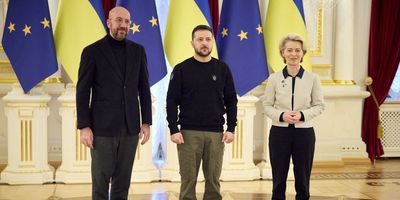The European Union agreed Thursday to open accession talks with Ukraine, overcoming opposition from Hungarian PM Viktor Orbán, who briefly left the room in a pre-arranged move as other member states voted unanimously in favor.
President Volodymyr Zelensky welcomed the news, tweeting that it was "A victory for all of Europe. A victory that motivates, inspires, and strengthens."
The EU will also open talks with former Soviet Moldova and granted EU candidate status to Georgia.
To be clear, it will be many years before Ukraine joins, if ever: The process entails dozens of political, financial, and regulatory benchmarks that all 27 member states must recognize every step of the way.
It was a symbolic win for Zelensky at a tough time. With his counteroffensive against Russian invaders bogged down, he’s been fighting to keep up support from the US and the EU, his two main backers. It also helped boost morale at home and in the trenches.
But that win was quickly followed by another setback late Thursday as Orbán blocked the additional long-term €50 billion aid package the EU was debating for Ukraine. Dutch Prime Minister Mark Rutte said the matter would be raised again in early 2024 and that he was "fairly confident we can get a deal early next year."
